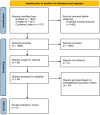Comparative Efficacy of Semaglutide Versus Liraglutide or Efinopegdutide on Weight Loss in Obese Patients: A Systematic Review and Meta-Analysis
- PMID: 39776746
- PMCID: PMC11704649
- DOI: 10.7759/cureus.75304
Comparative Efficacy of Semaglutide Versus Liraglutide or Efinopegdutide on Weight Loss in Obese Patients: A Systematic Review and Meta-Analysis
Abstract
Glucagon-like peptide-1 agonists (GLP-1 RAs) have produced substantial weight loss effects in type 2 diabetes mellitus (T2DM) cohorts, but these effects have not been thoroughly studied in patients with obesity and without diabetes. This review aimed to analyze direct comparative studies for semaglutide versus other GLP-1 RA (liraglutide and efinopegdutide) in facilitating weight loss and evaluating adverse events in patients with obesity. A systematic search following the guidelines established by the Preferred Reporting Items for Systematic Reviews and Meta-Analyses (PRISMA) was performed in PubMed, Embase, and Cochrane Library for direct comparative studies comparing semaglutide with other GLP-1 RA on weight loss in patients with obesity. A narrative synthesis and meta-analysis were performed to analyze the differences in weight loss between cohorts. A meta-analysis found that semaglutide produced a greater effect on mean weight loss compared to liraglutide, but did not produce a significant difference compared to efinopegdutide. Semaglutide, liraglutide, and efinopegdutide were well-tolerated and were associated with primarily minimal to moderate severity adverse effects, most of which were gastrointestinal. Future studies should continue to focus on conducting direct comparisons between GLP-1 RAs and emerging multi-receptor GLP-1 RAs, such as efinopegdutide, tirzepatide, and retratrutide, to determine clinical efficacy, long-term safety, and identifying the most effective regimens for clinical practice.
Keywords: efinopegdutide; glp-1 agonist; liraglutide; obesity and overweight; semaglutide; weight loss.
Copyright © 2024, Wen et al.
Conflict of interest statement
Conflicts of interest: In compliance with the ICMJE uniform disclosure form, all authors declare the following: Payment/services info: All authors have declared that no financial support was received from any organization for the submitted work. Financial relationships: All authors have declared that they have no financial relationships at present or within the previous three years with any organizations that might have an interest in the submitted work. Other relationships: All authors have declared that there are no other relationships or activities that could appear to have influenced the submitted work.
Figures
References
-
- Epidemiology of obesity. Sørensen TI, Martinez AR, Jørgensen TS. Handb Exp Pharmacol. 2022;274:3–27. - PubMed
-
- Healthy weight loss maintenance with exercise, liraglutide, or both combined. Lundgren JR, Janus C, Jensen SB, et al. N Engl J Med. 2021;384:1719–1730. - PubMed
-
- Efficacy and safety of semaglutide compared with liraglutide and placebo for weight loss in patients with obesity: a randomised, double-blind, placebo and active controlled, dose-ranging, phase 2 trial. O’Neil PM, Birkenfeld AL, McGowan B, et al. Lancet. 2018;392:637–649. - PubMed
-
- Efficacy of the glucagon-like peptide-1 receptor agonists liraglutide and semaglutide for the treatment of weight regain after bariatric surgery: a retrospective observational study. Jensen AB, Renström F, Aczél S, Folie P, Biraima-Steinemann M, Beuschlein F, Bilz S. Obes Surg. 2023;33:1017–1025. - PMC - PubMed
Publication types
LinkOut - more resources
Full Text Sources


